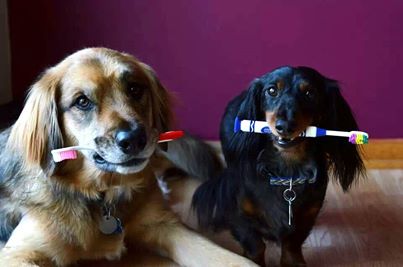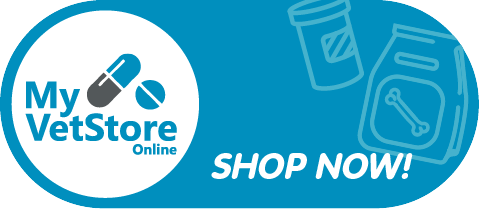|

Daily Dental Home Care
Daily brushing is the best prevention of dental disease!
Prior to starting home dental care, we recommend that your veterinarian perform a thorough oral examination to determine if there is any dental disease which needs to be treated before your brushing program. It would be inadvisable to start brushing your pet's teeth if there is any established dental disease as it will provide no benefit and may cause pain to your pet.
Brushing your pet's teeth is the main component of home care. The purpose is to remove plaque before it becomes tartar. Plaque is a slime comprised of bacteria, saliva and food particles which adheres to the teeth and fills the pocket between the tooth and gum. Left undisturbed, plaque rapidly collects minerals from the saliva to form the rock-like brown deposits known as tartar or calculus. By brushing daily, you remove plaque and so tartar builds up slower. As with all things, the results will depend on the effort you give it.
Daily brushing of your pet's teeth (do not use human toothpaste) along with the use of other products such as dental treats, Maxigard Oral Rinse and weekly application of Oravet Plaque prevention gel will help prevent periodontal disease. We also carry an excellent water additive called Healthy Mouth that will help slow down plaque and tartar buildup. This, in addition to at least yearly comprehensive dental cleanings under anesthesia, will help keep your pet's mouth pain and infection free.
Guidelines for Dental Home-Care
- When to start? As soon as possible. Eight to 12 weeks old is best. Pets don't need maintenance this young, but by starting when your pet is young and impressionable, they will become familiar with the routine when the permanent teeth erupt. It is a good idea to stop brushing while your pet is losing its baby teeth as the mouth will be a bit sore and your poking around with the brush will cause more pain. Once all the permanent teeth are in you can pick up where you left off.
- The first step is to work with your pet's mouth. With a little patience your pet will soon accept your attention. Make it fun for both of you. Use a lot of love and especially praise to gain their confidence. Try to have your practice sessions at the same time each day so your pet gets into a routine. Late in the evening often works well, as everyone involved is generally in a quiet mood. If your pet is highly motivated by food, try just before dinner with the meal acting as a reward for co-operating.
- Start by handling the muzzle and tickling the lips and soon you will be able to rub the teeth and gums with your finger.
- Next, put some flavored toothpaste on your finger and gently rub the teeth and gums.
- Finally, use a soft toothbrush to brush the teeth. There are several veterinary brushes available and many human brushes are well suited to animal use as well. Hold the brush at a 45 degree angle to the tooth and brush back and forth or from gum to tip. Brushing the tongue side of the teeth is less critical. Make it a game.
- There is an ever growing selection of veterinary tooth washes, pastes and gels. These products may (or may not) increase the effectiveness of your home-care program but remember, it's the brushing which does most of the cleaning. Brushing should be done daily for best results. Less than 4 times a week will have little if any effect. Human tooth paste is to be avoided as it will cause stomach upset if swallowed.
- It helps to give mildly abrasive foods and toys. Visit http://www.vohc.org for products with valid research to back their claims. Focus on products that are accepted to control plaque over those that just have a tartar claim. Avoid natural bones, antlers, dried cow hooves, hard nylon toys and large rawhide toys as these are hard enough to fracture teeth. If you would not want me to hit you in the knee-cap with it, don't let your dog chew on it!
- By following a consistent program of home-care, you will greatly improve your pet's dental health. This will mean fewer professional cleanings, less tooth loss and a happier, healthier pet. However, please remember that there is no substitute for professional veterinary care. We must work as a team to ensure a long and happy life for your pet.
| 


